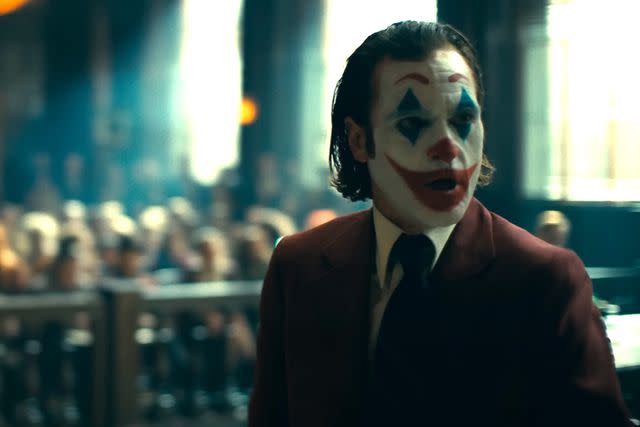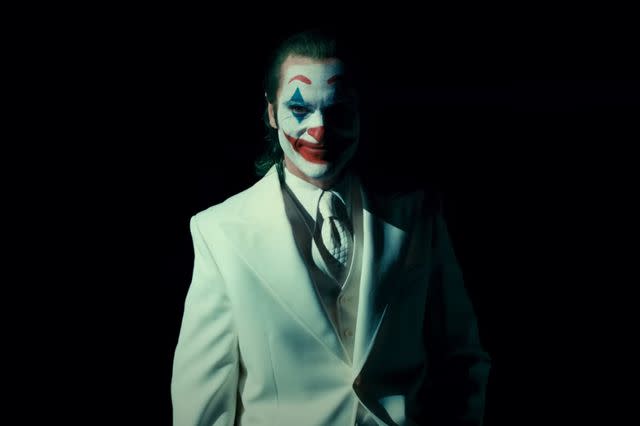“Joker: Folie à Deux” ending explained: Director Todd Phillips breaks down Arthur's shocking choice, Joker's true identity

Phillips tells EW why Arthur made that surprising confession during the film's climax — plus, we reveal what that last shot means for Joker's real identity.
Warning: This article contains spoilers for Joker: Folie à Deux.
As Lady Gaga reminds us by crooning somber lyrics over the final frame of the Joker sequel, which sees Arthur Fleck (Joaquin Phoenix) dying in a pool of his own blood following a brutal stabbing from a fellow Arkham State Hospital inmate, "that's life" for a man whose misdeeds range from starting a class war in Gotham City to shooting a TV host in the head on a live broadcast.
Outside of virtually confirming that Arthur won't return to terrorize Gotham again, the Joker: Folie à Deux ending also sums up the two-film series' central thesis: Arthur is no hero, villain, god, or even an anti-hero. He's nothing more than a lonely man, cast out by his family and the world. His evil-doing becomes his untimely undoing and merely bridges gaps to allow other, more powerful forces of change (for better or worse) to rise around him.
As we watch Arthur die before our eyes, we inevitably reflect on how he got here in the first place. The film follows Arthur as he prepares to stand trial for his crimes, though he receives a twisted glimmer of hope when he meets fellow Arkham patient Harleen "Lee" Quinzel (Gaga). His whimsical musical fantasies about their future romance together get him through the bulk of the legal proceedings. That is, however, until Arthur realizes there's something far less fulfilling about Lee's obsession with his Joker persona — a rude awakening he comes to grips with in two key moments: first, after listening to Arkham's ruthless team of guards (led by Brendan Gleeson) murder a young inmate after a day of defending himself in court; and after confronting Gary (Leigh Gill, returning from 2019's Joker), a witness for the prosecution whose lingering emotional trauma stems from watching Arthur violently stab to death one of the pair's street-clown colleagues.

Warner Bros. Pictures
Joaquin Phoenix in 'Joker: Folie à Deux'All of this weighs on Arthur's shoulders as he grapples with the person he wants to be: a man who serves to fulfill others' expectations of him as a counter-cultural, anti-institution revolutionary (like Lee and members of the Joker-led uprising in Gotham), or a survivor of abuse who finally makes peace with his demons and atones for his ways? He chooses the latter, confessing to a jury that there is no Joker and that he was simply Arthur all along. They subsequently find him guilty just as a literal bomb goes off outside the courthouse, allowing Arthur to flee and meet up with Lee for one final, damning exchange in which she, now mourning the symbolic "death" of the Joker she fell in love with, leaves Arthur for good.
Back at the hospital, after police re-capture Arthur, another inmate approaches him to tell him a joke with similar structure to the one he told Murray Franklin (Robert De Niro) before shooting him in the first film. The punchline, though, is a knife to the stomach, and Arthur bleeds to death. But behind him, the true Joker is revealed, as the young man cuts a bloody grin into his cheeks. Yes, this means Arthur was never really Joker in the first place; he merely served as the inspiration for the man who'd become Joker after him.
Sign up for Entertainment Weekly's free daily newsletter to get breaking TV news, exclusive first looks, recaps, reviews, interviews with your favorite stars, and more.
"He realized that everything is so corrupt, it’s never going to change, and the only way to fix it is to burn it all down," director Todd Phillips tells Entertainment Weekly when asked about Arthur's decision to confess his sins to the jury near the end of Folie à Deux. "When those guards kill that kid in the [hospital] he realizes that dressing up in makeup, putting on this thing, it’s not changing anything. In some ways, he’s accepted the fact that he’s always been Arthur Fleck; he’s never been this thing that’s been put upon him, this idea that Gotham people put on him, that he represents. He’s an unwitting icon. This thing was placed on him, and he doesn’t want to live as a fake anymore — he wants to be who he is."
Phillips admits that "the sad thing is, he's Arthur, and nobody cares about Arthur," pointing out that Gaga's Lee "never says 'Arthur'" in the film until she leaves him on the same steps he danced atop in the original movie. "[She's] realizing, I’m on a whole other trip, man, you can’t be what I wanted you to be," he explains. Phillips also confirms that, while boasting a dreamlike quality, the final exchange between Lee and Arthur is "actually, really happening" and isn't an imagined interaction like Arthur's fake romance with Sophie (Zazie Beetz) in the prior installment.

Warner Bros.
Joaquin Phoenix in 'Joker: Folie à Deux'The film's haunting themes (and the importance of its complimentary musical covers) are clearer in hindsight, particularly the repeated use of "That's Entertainment," the sequel's recurring show tune originally written for the 1953 movie The Band Wagon.
Through references to tragedies such as Oedipus Rex and Camille, lyrical changes to the Howard Dietz-written song on Gaga's companion soundtrack album Harlequin speak to the soul of Folie à Deux: No matter how insufferable one's suffering may be, the spectacle of violence and thirst for notoriety is an enchanting thrill for all who choose to watch. For Lee, at least, it's far easier to love the idea of someone than to embrace the grit underneath flesh and bone.
Ultimately, we all — including Arthur — got played in the end.
Joker: Folie à Deux is now playing in theaters.
Read the original article on Entertainment Weekly.

 Yahoo Lifestyle
Yahoo Lifestyle 
